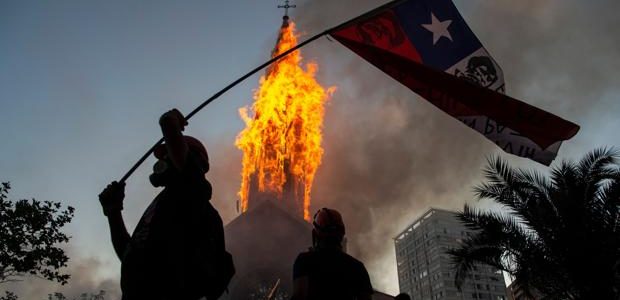
This month we remember the one-year anniversary of the social protests in Chile. The demonstrations were the consequence of civil discontent in the face of social exclusion, a bad pension system, poor education, health, among others.
On Sunday 18 October 2020, thousands of citizens took the streets of Santiago de Chile again to commemorate the beginning of the protests. Although it began as a peaceful demonstration, as the day passed it became more and more violent, unleashing acts of looting and vandalism.
On this occasion, the Catholic Church was once again the target of acts of vandalism. Violent groups entered the back of the Church of Franciso de Borja, removed religious figures and other objects that were destroyed, or used to set up barricades. Similarly, a mob attacked the Church of the Assumption, taking out religious figures and setting fire to the temple.
On the other hand, the Franciscan Order of Chile reported that “the temple of San Francisco in La Serena was desecrated by a group of protesters causing damage to the access doors, benches and images inside the temple.” Other media reported that in the El Tabo district of Valparaíso, unknown persons threw paint and sprayed the front of the Nuestra Señora del Rosario parish.
According to data from the Violent Incidents Database (VID), since 2017, more than 40 acts of vandalism have been recorded against churches of Christian worship, especially against the Catholic Church.
As we can see, these types of attacks are not isolated events in the country. Although social protests in Chile have an anti-government component, the attitude of rejection towards the Church responds in part to the conception that, by seeking opportunities for dialogue and alliances with the government, the church is also responsible for social inequalities, and the violation of human rights, especially of women.
These attacks are a sign of the growing intolerance towards Christianity in the country, especially Catholicism. These are not accidental fires or thefts that are the result of common crime. In these actions, we can see frontal rejection of the Church and what it represents. Images are destroyed and desecrated, the walls of the temples are painted with phrases offensive to the Catholic creed and its leaders; not to mention the arson of the temples, as a symbolic way of destroying the Church from its foundations.
Even when these actions are attributable to only one group of citizens, there is a risk that little by little this behavior will normalize and implies that, although Chile is a democratic country that guarantees human rights, it is not a country free of violations of the right to religious freedom.
Chile finds itself at a crucial stage. The recent approval of the reform of the Constitution that has been in force since 1980 is an opportunity to get out of the social and political crisis that has dominated the country since last year.
Opinions on the reform have been diverse, even within religious communities, especially Evangelicals. Some members have expressed concern that the new Constitution will not uphold certain principles and values, however, it is too early to know.
However, even with a new Constitution, respect for human freedoms cannot be absolutely guaranteed, much of it also depends on the degree of tolerance and respect on the part of society. For this reason, the increasing degree of violence of a sector of Chilean society against places of worship in the country is worrying, is a situation that puts at risk the full exercise of Article 18 of the International Covenant on Civil and Political Rights and Art. 12 of the Convention on Human Rights.
*Image: Martín Bernetti (AFP)
